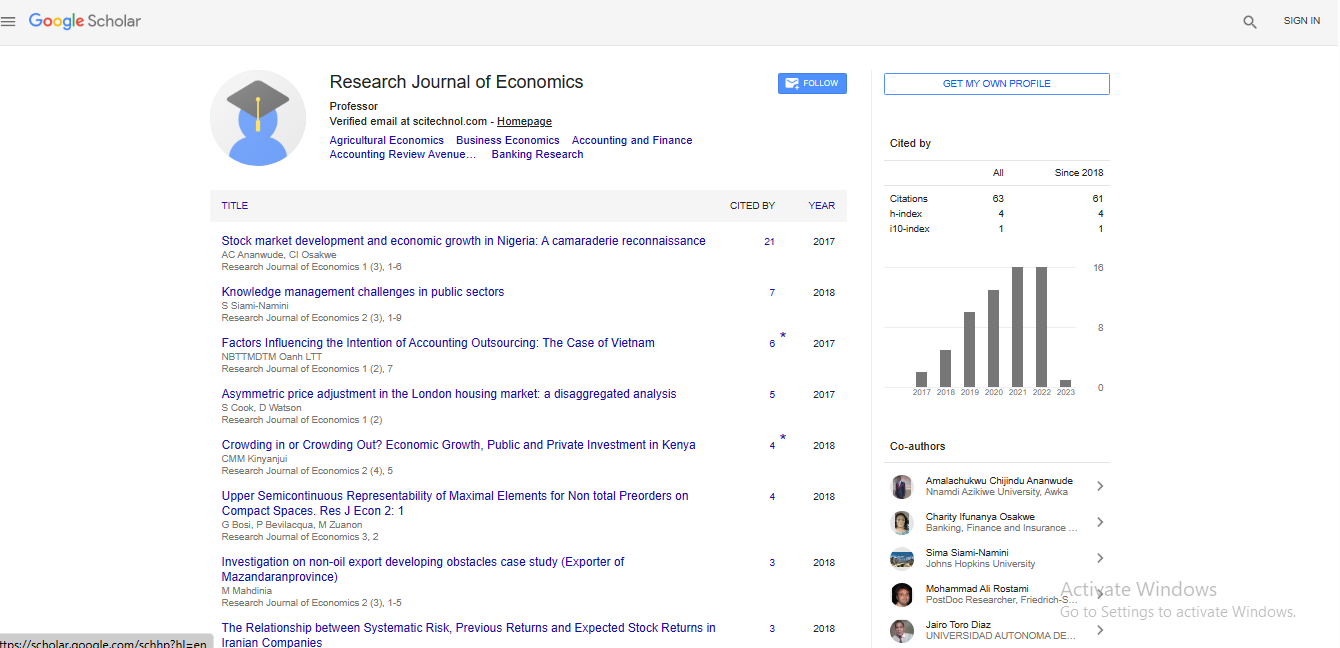Commentary, Res J Econ Vol: 8 Issue: 1
Goal of Investing in Finance and Return on the Capital
Chauing Yuhng*
Department of Marine Economics and Management, Shandong University of Finance and Economics, Jinan, China
- *Corresponding Author:
- Chauing Yuhng
Department of Marine Economics and Management,
Shandong University of Finance and Economics,
Jinan,
China;
E-mail: chauing_yuhng@gmail.com
Received date: 04 November, 2023, Manuscript No. RJE-23-119230;
Editor assigned date: 06 November, 2023, PreQC No. RJE-23-119230 (PQ);
Reviewed date: 20 November, 2023, QC No. RJE-23-119230;
Revised date: 15 July, 2024, Manuscript No. RJE-23-119230 (R);
Published date: 22 July, 2024, DOI: 10.4172/RJE.1000174
Citation: Yuhng C (2024) Goal of Investing in Finance and Return on the Capital. Res J Econ 8:1.
Description
"Commitment of resources to achieve later benefits" is the classic definition of investment. "To modify the pattern of expenditure and receipt of resources to optimize the desirable patterns of these flows" is one definition of an investment that takes a broader view. When receipts and expenses are expressed in monetary terms, the net amount of money received over a certain period of time is referred to as cash flow.
Usually, investing comes from giving up consuming. Early people had to decide how much grain to keep for future plantings and how much to consume after the harvest in a strictly agricultural society. The last one included investing. Our production potential is divided in today's society between investment products like semiconductor foundries and pure consumption goods like hot dogs and hamburgers. Our gross national product increases by one dollar if we produce hamburgers worth one dollar today. The gross national product increases by one dollar if we build a semiconductor foundry today, but it will increase much more the next year since the foundry will continue to make computer chips long after hamburgers are extinct. Investment generates economic growth in this way. Human development would come to an end without it.
The goal of investing in finance is to get a return on the capital put in. The return might be made up of unrealized capital appreciation (or depreciation), investment income like dividends, interest, or rental income, or a mix of capital gain and income. It could also be the result of the sale of a property or investment. Gains or losses in currency resulting from fluctuations in foreign exchange rates may also be included in the return. Riskier investments typically entail higher expected returns for the investor. A low-risk investment typically yields a poor return as well. In a similar manner, there's a probability of huge losses with great risk. It's common advice for investors, especially new ones, to diversify their holdings.
Transferring rights from one party to another is the essence of financial investing. The opposite party has disinvested while the first has made investments. It doesn't increase an economy's actual capital stock. Investing money is when one buys stocks, shares, government bonds, and debentures. Because it just involves the simple transfer of ownership titles from one person to another and leaves the real capital stock of the economy unchanged, it is known as a financial investment.
Stocks and trades involving liquid cash are not the only types of investments. They may also be found in diamonds, valuable metals, and pieces of real estate, whether personal or business. These investments frequently yield a respectable return. One may exchange practically any period in their life for gold, silver, and diamonds to get a sizable sum of money. It is quite uncommon for precious metals to lose out by a significant amount, even when their price doesn't always seem to be rising. Owned real estate close to major thoroughfares and commercial districts may be quite beneficial for investors. The worth of these kinds of properties may only rise with time. It is important to constantly keep in mind that fiat money is the primary form of currency in our world. Investing in something far more tangible, like precious metals or real estate, is always a smart idea since fiat money lacks a commodity attached to its worth. In this way, your money has a more defined worth than other people's, even if not have access to liquid currency. Not to mention that it end up with more money than initially invested when the investments are cashed in.
 Spanish
Spanish  Chinese
Chinese  Russian
Russian  German
German  French
French  Japanese
Japanese  Portuguese
Portuguese  Hindi
Hindi 